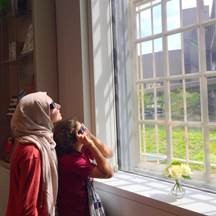Eclipsing Hate
By Celene Ibrahim, PhD
Posted on
Viewing glasses flew off shelves as a complete solar eclipse swept darkness over much of the continental United States in August of 2017. Hardcore eclipse enthusiasts and casual observers alike stared into the darkened afternoon sky; many Muslims recited eclipse prayers together in mosques, homes and workplaces.
 On my way home that day, my eye caught a Cambridge yard sign reading: “Eclipse Hate.” My gut wrenched as I was taken — from the sweet afternoon memories of people marveling together with strangers on sidewalks, passing eclipse glasses back and forth with generous enthusiasm — to the darkness of the white nationalist, Nazi sympathizers with their tiki torches blazing, weapons menacing, swarming the streets and green spaces of Charlottesville, Virginia.
On my way home that day, my eye caught a Cambridge yard sign reading: “Eclipse Hate.” My gut wrenched as I was taken — from the sweet afternoon memories of people marveling together with strangers on sidewalks, passing eclipse glasses back and forth with generous enthusiasm — to the darkness of the white nationalist, Nazi sympathizers with their tiki torches blazing, weapons menacing, swarming the streets and green spaces of Charlottesville, Virginia.
How can we, as individuals and communities, intervene in countering this destructive hate and fear that brews beneath the surface of our polity? How can we prevent it from again instigating violence and causing havoc? What can we learn from the peace activists and clergy of all colors and cloths who amassed a counter presence with prayer and song in a testament to the resilience of the human spirit?
With the rise of isolationism, nativism, rampant fear-mongering, the spread of American-made weapons around the globe, and even the proposals from those in positions of power for increased militarization of our schools and workplaces, what wisdom can be derived from core texts, teachings and traditions? How do we understand our seemingly innate capacities for monstrosity? How can we overcome our more destructive collective impulses? What can help us bridge divides, counter hate, and stand up for those whose safety and security are most threatened? What interventions does the present moment necessitate?
These questions are the heart of my work.
Celene Ibrahim, PhD, is currently the Muslim chaplain at Tufts University. She will be returning to Mercy by the Sea on June 15, 2019 to facilitate the day program, “Social Justice and Qur’anic Social Ethics: Contemporary Explorations.” Learn more about her program.
